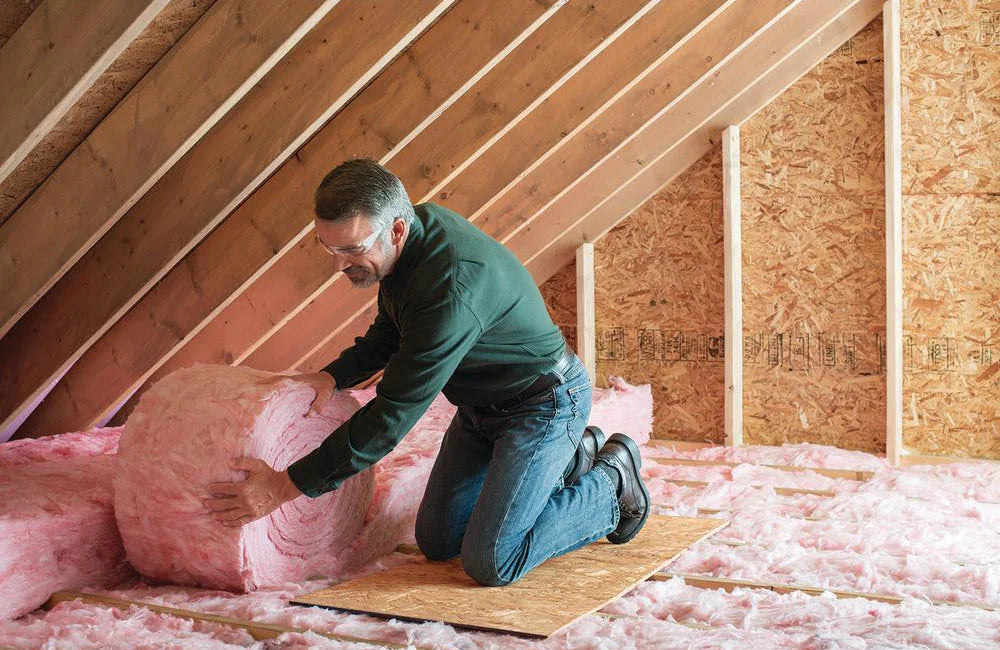Insulation is essential for comfort, energy efficiency, and long-term savings. Various insulating options are available, so consider factors such as cost, effectiveness, safety, and environmental impact to get the maximum benefits.
However, efficiency should be your top priority when choosing insulation options. The R-value of insulation measures its thermal resistance or how well it resists heat flow. Different types of insulation have different R-values, so choose one that meets your home's needs.
Here, we'll explore different types of insulation and provide a detailed comparison for maintaining an ideal indoor temperature. We will also discuss some of the best insulation for different applications. So, let's get started.
What's the Best Insulation Based on the Type?
When choosing the best type of insulation for your home, there are several options you need to consider.
- Spray Foam Insulation
- Fiberglass Batt Insulation
- Cellulose Insulation
- Mineral Wool Insulation
Spray Foam Insulation
You must consider spraying foam to determine the best insulating material for your house. This insulation has a high R-value, ranging from R-6 to R-7 for closed-cell insulation and R-3.6 to R-3.9 for open-cell insulation. The insulation keeps your home warm in the winter and cool in the summer because it's thermally efficient.
Another advantage of spray foam insulation is its ability to act as a vapor barrier, preventing moisture from seeping into your walls and causing damage. It's water resistant and resistant to mold and insects, making it a durable and long-lasting insulation option.
However, spray foam insulation has a higher initial cost than other types. Despite this, its numerous benefits make it suitable for newer and older homes.
Fiberglass Batt Insulation

Fiberglass batt insulation offers excellent thermal performance and affordability. Its R-value ranges from R-2.9 to R-3.8 for batts and R-2.2 to R-2.9 for loose fill, slowing heat transfer.
These batts are commonly used due to their cost-effectiveness and ease of installation. DIY enthusiasts find them particularly convenient as they can quickly install them. In addition, fiberglass batt insulation is fire-resistant, contributing an added layer of safety.
Still, consider your local climate when choosing this insulation type, as it may be less effective in colder regions.
Cellulose Insulation

Cellulose insulation is an eco-friendly option made from recycled paper. It's denser than fiberglass, allowing it to retain heat and be more energy efficient, with an R-value of R-3.1 to R-3.8. Moreover, cellulose insulation repels insects.
Yet, there are some considerations to keep in mind. Cellulose insulation has the potential to be a fire hazard. Another concern is settling and moisture issues, which may impact the overall effectiveness of the insulation.
Mineral Wool Insulation
Consider mineral wool insulation as a contender when determining the best insulation type for your home temperature. With a higher R-value, R-4, than fiberglass, mineral wool offers excellent thermal resistance, making it an effective choice.
Mineral wool is composed of natural materials and is also fire-resistant, providing an added layer of safety. It excels at soundproofing, making it a great option for reducing noise transmission between rooms. Besides being eco-friendly, mineral wool is made from recycled materials.
However, mineral wool insulation can be more expensive and challenging to install than other types. Despite these considerations, its benefits make it a strong contender for the best insulation type.
Best Insulations for Keeping Your Home Warm in Winter
When considering appropriate insulation for your home, you can choose one of our following products according to your property needs.
Vega Bond V200 Closed Cell Fast Rise Spray Foam
Our Vega Bond V200 spray foam is the perfect solution for improving the insulation and sealing of your building. Whether in basements, attics, or other areas requiring an airtight barrier, it can effectively seal out unwanted air leaks and infiltration and act as a moisture/vapor barrier.
With an R-value of nearly R-7 per inch, this spray foam provides excellent insulation. V200 covers 200 board feet, meaning 200 sqft at 1-inch thickness. This ready-to-spray kit includes a 9.5-ft Gun/Hose Assembly, safety goggles, two fans, six cone nozzle tips, safety coveralls, and gloves.
The product is an ASTM E84-approved class A building material with the lowest fire spread rate and minimal smoke production, making it a safer and more reliable option.
Vega Bond V600 Closed Cell Fast Rise Spray Foam
The Vega Bond V600 is a high-quality insulation product widely used in new construction and renovation projects. It is perfect for attics, basements, and other areas and provides an airtight seal.
This spray foam is an energy-efficient solution that provides a robust barrier against air leaks, moisture, mold, and sound. If you're concerned about the safety of your property, Vega Bond V600 ensures it with its ASTM E84-approved Class A Building Material.
Moreover, this fast-rise insulation is ready-to-use, disposable, and recyclable. It is effortless to install and comes with a 15-ft. Gun/Hose Assembly, safety goggles, Safety coverall, gloves, 2 fans, and 6 Cone Nozzle Tips, making the insulation process simple.
Is closed-cell insulation better than open-cell insulation for spray foam?
If you're looking for the most efficient spray foam insulation, closed-cell insulation is a superior choice to open-cell insulation. Closed-cell foam has a higher R-value, typically around 6.0 per inch.
Even so, certain closed-cell foams, such as the Vega Bond V600 Closed Cell formula, boast even higher ratings of up to nearly 7 per inch. This higher rating is advantageous because it enhances the ability of closed-cell foam to regulate heat flow in and out of a structure.
What thickness of insulation is best for house walls?
Getting the proper insulation thickness is imperative for a comfortable and energy-efficient home. We suggest at least 2 inches of high-density closed-cell spray foam for sufficient insulation. However, depending on the type of insulation you choose, you might need more.
Remember, certain areas of your home may require different insulation thicknesses. Please check your local requirements.
Invest in a Quality Insulation for Your Home's Efficiency
When choosing the best insulation for your old or new home, spray foam insulation is a top contender. Its versatility, high R-value, and ability to create an airtight seal make it an excellent energy-efficient choice.
Make sure you take advantage of your chance to experience the quality of our insulation products, Vega Bond V200 and V600. Visit our site to get superior insulation from us.




